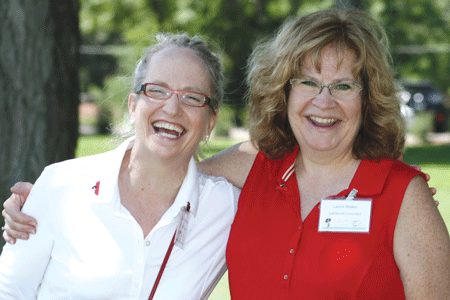By ERIN ELLIOTT BRYAN / Community News Editor
“Having cancer gave me membership in an elite club that I’d rather not belong to.” — Gilda Radner
When Jewish comedian Gilda Radner was diagnosed with ovarian cancer in 1986, she was fortunate to connect with a small support community in Santa Monica, Calif. But when she and her family, including husband Gene Wilder, traveled around the country, they were unable to find the same kind of emotional and social support that they had found to be so comforting.
Following Radner’s death in 1989, Wilder and Joanna Bull, Radner’s cancer psychotherapist, started the Gilda’s Club movement — to open places where men, women and children, and their family and friends, could gather to receive whatever emotional and social support they may need. The first Gilda’s Club, in New York City, opened its signature red door in June 1995.
“Gilda’s dying wish was that no one should have to face cancer alone,” said Michelle Silverman, executive director of Gilda’s Club Twin Cities. “What they did in New York City was a replicate of what she was getting in Santa Monica, plus they ratcheted it up with a whole bunch of additional programming.”
The history of Gilda’s Club Twin Cities began eight years ago, when three women approached the national organization about opening a clubhouse here. After assessing the need, raising money and recruiting volunteers, the organization became part of the Cancer Support Community, a global network that includes more than 50 Wellness Communities and Gilda’s Clubs across the United States.
Gilda’s Club Twin Cities plans to open its 7,300-square-foot clubhouse on Wayzata Boulevard in Minnetonka later this year. The organization has already raised two-thirds of its $3 million goal.

“When we open our doors here in the Twin Cities, we will be providing support, education, healthy lifestyle programs, social programs, information and referral — all at no cost for anyone facing cancer,” said Silverman, who has been touched by cancer in several ways.
According to Silverman, 25,000 people in the Twin Cities receive a brand-new cancer diagnosis each year. And three out of four people will be touched by cancer in their lifetime.
“It hits the person very hard, and it hits friends, family, caregivers, co-workers very hard, and it can be a long journey,” Silverman said. “And it can be very lonely and very isolating.”
Gilda’s Club Twin Cities is not a residential facility, but it will be open six days a week, 10 to 12 hours per day, offering programs run by licensed mental health professionals and volunteers. Its services will be available to anyone impacted by a cancer diagnosis.
Silverman noted that the Jewish community is hit especially hard by cancer, particularly Ashkenazi Jews, who are more likely to inherit the BRCA 1 and BRCA 2 gene mutations that can cause breast and ovarian cancer.
“At Gilda’s Club, we serve all cancers, all people, all ages,” Silverman said.
In addition to traditional support groups and education, Gilda’s Club offers healthy living and nutrition information, including cooking in the facility’s test kitchen; mind-body programs, such as yoga, Tai Chi, drumming and dancing, as well as expressive art therapies; social opportunities like potlucks, book clubs and “laugh fests”; and referrals to other local cancer organizations.
“One hundred percent of the people won’t want 100 percent of the activities that we have,” Silverman said. “One of our philosophical beliefs at Gilda’s Club is that our members are the experts of their cancer… Part of what we do at Gilda’s Club is we create a community where members can come together and find each other, and talk to each other about what’s going on and work together and support each other. And there’s nothing like that in the Twin Cities.”
For Laurie Walker, who began her involvement with Gilda’s Club as a member of the local board of directors and now works in development and marketing, it was easy to see that the organization was needed in the community. She was diagnosed with breast cancer 14 years ago and has had multiple recurrences.
“When I was first diagnosed with cancer, I had the fortunate opportunity to find a group of women in a support group who were able to help me through a time of my life when I really needed to understand what was going on,” Walker said. “But what was sorely lacking in that is that there was no place for my family. I was able to find some very specific support just for me, but I also had family members who were really struggling with what was happening and there was no place for them to go.”
When she heard about Gilda’s Club, she realized that the organization’s mission is to provide the support for everyone — men, women, children and teenagers — who are the patient, a family member or even a dear friend.
“I just knew how critical that need was in the Twin Cities because I had lived it,” Walker said. “It’s a critical gap and it needs to be filled.”
To help Gilda’s Club Twin Cities open its clubhouse, Walker encourages people to donate money to its Paint the Door Red capital campaign, volunteer and help spread the word about the organization.
“The key is, when a person is going through cancer, they need the social and emotional support really to achieve some of the best outcomes,” Walker said. “When you’re going through a cancer experience, about 30 percent of your time, you’re in clinic — you’re at the hospital, you’re going to the doctor, you’re having treatment. Seventy percent of the time, you’re alone, and it’s during that alone time that you need to continue to receive care. But that care is not provided by doctors and clinics, that care has to be provided by Gilda’s Club.”
***
For information, visit: www.gildasclubtwincities.org.
(American Jewish World, 8.3.12)



















